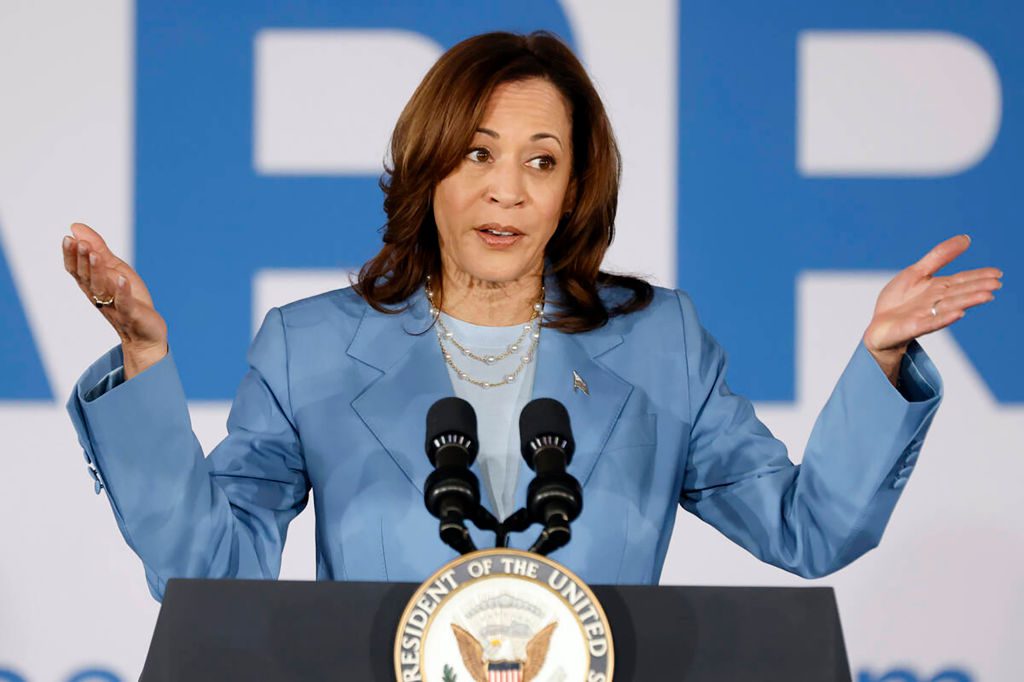
Vice President Kamala Harris speaks at a campaign rally on June 28, 2024, in Las Vegas. (Bizuayehu Tesfaye/Las Vegas Review-Journal/Tribune News Service via Getty Images)
The proposals are part of a larger plan for Harris’ potential first 100 days in office with the ultimate goal of slashing taxes for middle-class families and bringing down costs.
Vice President Kamala Harris unveiled a new economic platform Friday that seeks to make housing more accessible and affordable, lower grocery costs, implement a universal price cap for insulin, and provide new and expanded tax credits for parents.
The proposals are part of a larger plan for Harris’ potential first 100 days in office with the ultimate goal of slashing taxes for middle-class families and bringing down costs, her campaign said in a statement. It marks her first major policy announcement since becoming the Democratic presidential nominee after President Joe Biden announced last month he would not seek re-election.
Fewer than 90 days remain until the Nov. 5 election, giving Harris and her running mate Minnesota Gov. Tim Walz an abridged timeline for not only introducing themselves to swaths of voters unfamiliar with them, but also their vision and policy objectives for the next four years. Harris’ new proposals can be categorized into four main pillars:
Housing
Harris’ plans build off Biden-led initiatives to bolster housing inventory nationwide and limit how much corporate landlords can increase their rent. Public officials in Nevada for years have called for increasing construction to combat a surge in housing prices in recent years and say more action is needed to meet the state’s demand for affordable housing.
Harris is calling for the construction of 3 million units nationwide over the next four years, and is proposing a first-of-its-kind tax incentive for home builders who build houses targeted specifically at first-time homebuyers and other incentives to spur development. She’s also calling for $40 billion in federal funding for local governments to support localized methods of construction financing.
Additionally, the plan would provide first-time home buyers up to $25,000 in down payment assistance for people who can prove they paid rent on time for the past two years.
Nevada Treasurer Zach Conine, a Democrat, told reporters Friday that Harris’ plan would make housing more attainable for all and help states in need of more affordable units out of an “existential crisis.”
“Here in Nevada, housing instability is economic instability,” Conine said at a press conference hosted by the Nevada State Democratic Party. He noted that economic crises brought on by the 2008 recession and the COVID-19 pandemic disproportionately impacted Nevada relative to the rest of the nation.
“It was harder to get out of the recession, and it was harder to build back to where we are now.”
But one difference between the pandemic and the 2008 financial crisis, Conine said, was the safety net provided by the federal government, especially the American Rescue Plan Act (ARPA), which was one of the first major pieces of legislation signed into law during the Biden-Harris administration. Federal funds from that bill helped state governments, counties, and cities across fill budget shortfalls in the earliest stages of the economic recovery from the pandemic.
Conine noted Nevada was able to utilize $500 million in ARPA dollars for the statewide Home Means Nevada program launched in 2022 by then-Gov. Steve Sisolak. The initiative was launched to spur development of affordable units, as well as land acquisitions and upgrades for existing homes, among other uses, and Conine said Harris’ plan could similarly embolden local authorities to find housing solutions.
Harris’ new plan would also take action to repurpose certain federal lands for new housing developments — something housing advocates in Nevada say could help alleviate a tight real estate market. Harris did not specifically cite which land would be considered.
The median home price in Nevada has increased from $304,000 in June 2019 to $462,000 as of June of this year, according to the online real estate database Redfin — a nearly 52% increase. Rental prices have also swelled during that stretch, and housing experts estimate Southern Nevada alone needs an additional 80,000 new affordable units to adequately meet demand.
“We’re opening up 200, 300, 400 [affordable units] at a time and we’re doing the best we can at the state level,” Conine said. “But we need the federal government to step in and provide big assistance. And that’s exactly what Vice President Harris has rolled out in her housing policy.”
Tax credits for parents
Harris claims no American earning less than $400,000 will see an increase in taxes, and instead is hoping to cut taxes for more than 100 million Americans. Her plan would restore a Biden-era tax credit that was enacted under the American Rescue Plan Act that would make permanent a $3,600 per child tax credit for parents earning under $125,000 per year.
But Harris’ plan also calls for a new $6,000 tax credit for middle-income and low-income families with a child under one year of age; maintain the $3,600 annual tax credit for children ages 1-5, and extend a $3,000 credit for kids 6-17. Harris also proposed an expansion to the Earned Income Tax Credit that would allow-income earners (depending on number of dependents) to claim up to $1,500 on their returns.
“What I heard today was a plan to help support families like mine succeed and continue to move ahead,” said state Sen. Fabian Doñate, D-Las Vegas, whose district includes the Strip and parts of downtown Las Vegas and is the youngest lawmaker serving at the state level. “These are funds that can help families like my own be able to not just afford the bills, but be able to succeed and get ahead.”
More than 634,000 Nevada children benefited from the Child Tax Credit, according to Nevada Sen. Catherine Cortez Masto’s office, adding that more than 39 million households nationwide qualified for the incentive. Child poverty in the US dropped to a historic low of 5.2% in 2021, but a Columbia University review found that 18 million children under 17 (about 26% of all US children) were not eligible for the full tax credit because their family’s income was too low to qualify.
Lowering prescription costs and relieving medical debt
Harris says if elected, she will urge Congress to expand provisions of the Inflation Reduction Act that allowed the federal government to negotiate prescription drug prices with pharmaceutical companies and capped out-of-pocket expenses at $2,000 for Medicare recipients to all Americans, as well as capping the monthly price for insulin at $35 for everyone. The Harris plan additionally seeks to implement regulatory changes so that medical debt would be removed from credit reports and includes a pledge to cancel medical debt for millions nationwide.
Nearly 270,000 people in Nevada have some form of diagnosed diabetes, according to the American Diabetes Association, and the US Department of Health and Human Services reported that as of January, there were more than 11,000 Medicare enrollees in Nevada that use insulin.
Additionally, a 2022 brief from the state DHHS’ Patient Protection Commission found that about 19% of Nevada residents carried some form of medical debt. A separate survey commissioned by the Nevada Consumer Health Experience State Survey reported that 65% of respondents worried if they could afford the cost of health care.
Lowering food costs by targeting corporate price gouging
Harris’ plan also includes the first-ever federal ban on price gouging on food and groceries by allowing the Federal Trade Commission and state attorneys general, like Nevada Attorney General Aaron Ford, to investigate and impose penalties on companies found exploiting prices. A Harris-Walz administration says it would also crack down on corporate acquisitions and mergers that could undermine competition, and thus in turn raise food prices.
Food prices have increased steadily in recent years in large part due to post-pandemic inflation, which spiked as high as 9% in 2022. Since then, food prices in the Western US are up about 14%, according to the US Bureau of Labor Statistics’ Consumer Price Index.
“We know that grocery prices are probably one of the hardest pain points our families are facing in this very day and age,” said Doñate. “We want to make sure that we are supporting families front and center, and thanks to the efforts today of the proposals that have been released, we are now going to be able to hold corporations accountable for price gouging of grocery prices.”
One proposed merger a Harris-Walz Justice Department could potentially seek to break up would be the Kroger Co.’s $24.6 billion acquisition of Albertsons Companies, Inc., which has been opposed by many Democratic lawmakers at the federal level, including Nevada Sen. Jacky Rosen. Kroger and Albertsons, if combined, would control about 15% of the US grocery market, second only behind retail giant Walmart, according to the trade publication Supermarket News.
Rosen last week was one of 28 Democratic federal lawmakers who signed onto an amicus brief urging a federal judge to intervene and stop the proposed merger. Rosen was part of a push by lawmakers in December who successfully urged the Federal Trade Commission to file a lawsuit blocking the Kroger Company’s planned $24.6 billion acquisition of Albertsons Companies, Inc.
Both companies have a presence in Nevada, with Albertsons owning its namesake brand in addition to Safeway and Vons stores, while Kroger operates under the Smith’s Food and Drug brand. Kroger told the Las Vegas Review-Journal last month it is considering selling 16 stores to quell competition concerns, and said that zero stores would close if the merger is approved by regulators.
“When corporations consolidate, that leaves less market competition, which essentially increases the ability for prices to continuously go up, [like] for groceries,” Doñate said. “That’s a very scary thing.”

La senadora Jacky Rosen logra conservar su escaño en reñida contienda electoral
Tras los resultados más recientes tabulados el jueves por la mañana, varios medios dieron a conocer que la contienda entre la actual senadora...

Race for Nevada US Senate seat called for Jacky Rosen by multiple outlets
Following the newest results tabulated Thursday morning, the race between Nevada Democratic incumbent US Sen. Jacky Rosen and Republican Sam Brown...

Un análisis de los resultados de las elecciones de 2024 en Nevada
Si bien Donald Trump ganó la presidencia y parece estar en camino de ganar en Nevada, su éxito no se traduce tanto para los republicanos que...

Harris says nation must accept election results while urging supporters to keep fighting
Harris delivered her remarks at Howard University, her alma mater and one of the country's most prominent historically Black schools, in the same...

Election fatigue? Here’s how to recharge your mental health
We all have our personal struggles in life, from work stress to relationship drama, but something about the 2024 election season simply felt...

Breaking down the 2024 election results in Nevada
While Donald Trump won the presidency and appears to be on track to winning Nevada, his success isn’t translating as much for down-ballot...





